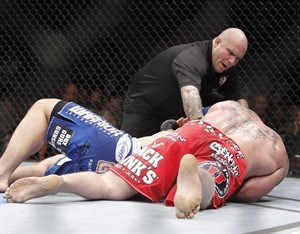
Referee John Rosenthal stops a fight at a UFC mixed martial arts title match July 3, 2010, in Las Vegas. THE CANADIAN PRESS/AP, Eric Jamison
November 07, 2012 - 4:00 AM
VANCOUVER - British Columbia plans new rules to require anyone who wants to judge a professional mixed-martial-arts fight to get certified, a move the head of the sport in Canada says is good for everyone.
Tom Wright, UFC's director of Canadian operations, says the new rules will help attract more big-money professional fights to the province.
B.C.'s Ministry of Community, Sport and Cultural Development announced Tuesday MMA judges who want to be certified with the soon-to-be-formed Provincial Athletic Commission will have to pass a rigorous training course.
The course is through the California-based Certification of Officials for Mixed Martial Arts National Development program.
The certification is part of a larger regulatory framework the provincial government is developing for professional boxing, kick-boxing, mixed martial arts and other similar sports, which have until recently been regulated by local government bodies.
"I think it can only help to increase the number of events," said Wright.
"What this is really saying is that the British Columbia government is taking this sport very seriously, it recognizes that it's a growing sport, that it's a vibrant sport, that it's one that's going to be around for a long time.
"They want to make sure the standards are in place and the regulatory requirements are set so that B.C. is a place where people can come with confidence, that athletes can come and compete with confidence and promotions can come and have their events with confidence because they know it's going to be regulated professionally."
Wright said UFC fights bring in some big money, pointing to one event at Toronto's Rogers Centre that attracted 55,000 fans and about $35 million.
According to its website, the COMMAND program is headquartered in Valencia, Calif., and offers three-day and two-day certification courses to MMA referees and judges.
Referee candidates, for example, must pass a techniques test, a written test, a practical application test and a situational test, the last of which requires the candidate to answer verbal questions. All require a score of at least 90 per cent. Candidates must also know dozens of takedowns, submissions, positions, sweeps, kicks and strikes.
Those wanting to be judges must undergo written and techniques tests and score a five-round fight, earning a mark of at least 90 per cent in each section to be certified.
After passing their courses, referees and judges must also sign a code of ethics.
"Any of our officials that would be inside the octagon for UFC fights obviously have fulfilled the minimum requirements as suggested through this program that the B.C. government is doing," said Wright.
He said the regulations set a minimum acceptable standard, but passing the course doesn't guarantee an individual will be selected to officiate at a UFC event.
This past May, the provincial government introduced Bill 50, known as the Athletic Commissioner Act, which would establish a commissioner to oversee boxing, kick-boxing and mixed martial arts events across B.C.
The commissioner would license athletes, promoters and officials, oversee athletic contests and ensure all combat sport events conform to provincial rules.
The commissioner would also replace the local government bodies that currently regulate the events.
Meantime, the federal government is amending the Criminal Code so MMA will be included under the list of permitted sports.
Bill S-209 was sponsored by Sen. Bob Runciman, has passed the Senate and the Standing Senate Committee on Legal and Constitutional Affairs. It was introduced to the House of Commons where it passed first reading Oct. 18.
News from © The Canadian Press, 2012